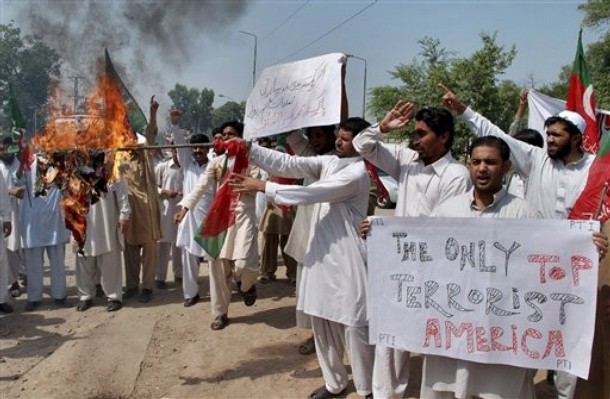Debating Afghanistan

Joshua Foust at Registan argues that the over-riding strategic rationale for nation building in Afghanistan is to prevent India and Pakistan from coming to blows:
And lest anyone think it is appropriate to write off the India-Pakistan conflict as somebody else’s problem, it is never somebody else’s problem when nuclear weapons are involved. As Jari Lindholm reminded, India and Pakistan have come a hair’s breadth from nuclear conflict twice over Kashmir. And like it or not, it is a compelling and vital American interest to prevent nuclear conflict in South Asia—which makes “fixing” Afghanistan in some way also a vital American interest.
I'm not sure how far this really takes us when you consider that India and Pakistan have been fighting over Kashmir for six decades. Nuclear weapons have changed the potential lethality of that fight, and arguably heightened America's interest in seeing it resolved, but the underlying causes of the dispute long predates the introduction of nuclear weapons. If a solution was not forthcoming before the introduction of nuclear weapons, I'm not sure there's one to be found now, particularly if we're focusing on Afghanistan, which is at best tangential to the core problem in India-Pakistan relations. It's difficult to see how the dynamics of the Kashmir conflict change even if Afghanistan were somehow magically taken off the table.
It's also worth noting that the U.S. was able to reduce tensions between India and Pakistan with diplomacy when they edged toward a nuclear stand-off in 2002. It was one of the unheralded diplomatic successes of the Bush administration. Why wouldn't said diplomacy work as a model for navigating potential India-Pakistan flare ups vs. pouring billions of dollars and thousands of lives into Afghanistan?
And while it's true that the risks of a war between Pakistan and India are greater with nuclear weapons, those weapons could just as easily sharpen the minds of leaders on both sides about the potential costs of a war. The balance of terror isn't an ideal scenario, but it has so far restrained both parties from launching a nuclear salvo.
Foust continues:
When it comes to Pakistan, the big danger is not in a Taliban takeover, or even in the Taliban seizure of nuclear weapons—I have never believed that the ISI could be that monumentally stupid (though they are incredibly stupid for letting things get this far out of hand). The big danger, as it has been since 1999, is that insurgents, bored or underutilized in Afghanistan, will spark another confrontation between India and Pakistan, and that that confrontation will spillover into nuclear conflict.
Isn't the problem here Pakistan itself? It's pretty clear that irrespective of the state of things in Afghanistan, it is the Pakistani military that is driving, or at least enabling, terrorist violence against India. Denying insurgents a safe haven in Afghanistan doesn't help much if the Pakistani military remains committed to fighting India with terrorist proxies. There are a lot of places inside Pakistan where insurgents can train.
Stepping back, I think Foust is over-stating the nature of America's interests. Nation building in Afghanistan to ease Pakistani-India tensions is a very convoluted way of saying that U.S. soldiers need to be cannon fodder for the Taliban so that these insurgents don't get "bored" and turn their guns on India. That doesn't strike me as a wise use of American power, nor the best way to help Pakistan and India reach some workable accommodation over Kashmir.
UPDATE: Michael Cohen makes a similar point at Democracy Arsenal:
I really don't see why American troops have to be put in harm's way because a blow-up in Afghanistan might turn into a full-fledged India-Pakistan war. Why would the United States willingly hold itself and its soldiers hostage to an unresolved regional conflict? And are there really no other options - for example, diplomatic - for preventing such a war than "fixing" Afghanistan?But there is something else about this argument that troubles me. Josh alleges that the big danger is if insurgents bored from the Afghanistan fight will try to spark a confrontation between India and Pakistan. I'm not clear as to why Afghan Taliban would in the wake of a US withdrawal want to get involved with the fight for Kashmir (did that happen from 1996-2001?) but the bigger question is that didn't jihadist terror groups already try to spark that conflict last November in the Mumbai attacks that killed 173 people? Not to minimize those horrific attacks, but even though the jihadists behind the Mumbai attacks were based in Pakistan - and probably backed by the ISI - it didn't spark a military escalation between the two countries. What would be different if we left Afghanistan?
But I will say one thing, if THIS is the rationale for saying I can understand "why even the war supporters cannot articulate them." I seriously doubt most Americans believe that we should be fighting a war in Afghanistan so that India and Pakistan don't fight one in the future.
(An anti-American rally in Peshawar, Pakistan. AP Photos)



